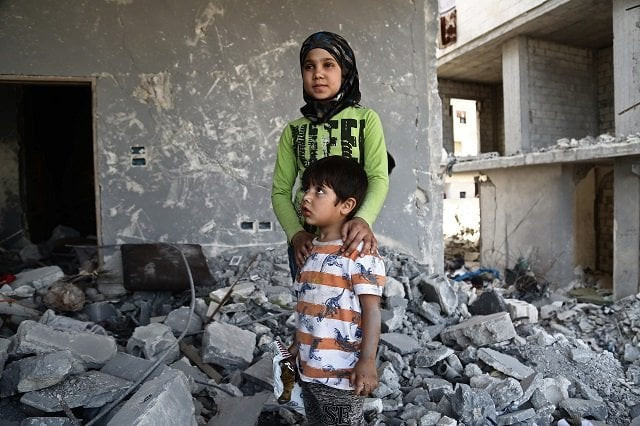Syrians flee to makeshift camps as bombing escalates in south
Thousands have fled intensifying Syrian government shelling in recent days on rebel-held territory south of Damascus

Syrian girl Inas Haymur and her brother Saad (down) pose for a photograph in Afrin, on May 26, 2018. PHOTO: AFP
They are among thousands who have fled intensifying Syrian government shelling in recent days on rebel-held territory south of Damascus.
Fearing an imminent ground assault, they escaped carrying whatever they could from their battered homes.
Syrian state media says dozens of Israeli rockets fired into Syria
Among the shelters erected on a barren piece of land in the village of Burayqah, Quneitra province, stands the one that houses Ali al Homsi and his family.
They escaped deadly bombardment on their hometown of Kafr Shams, which lies in a wedge of territory between the provinces of Daraa, Quneitra, and Damascus.
The area has come to be known as the Triangle of Death, for the bloody battles fought there since Syria's war erupted in 2011.
"I wasn't planning on coming here, but the intense bombing in recent days forced us to leave--especially after it killed more than one of our loved ones," said Homsi, 36.
"That's what made us flee."
He was squatting on the dry earth as his young sons took a break and lay in the sun nearby.
"We're setting up this tent just so we can have shelter," he told AFP. "But we don't have the basic necessities for life--there's no water here to drink or wash with."
After neutralising rebel strongholds on the edge of the capital, President Bashar al Assad is turning his attention to the south, the cradle of the seven-year uprising against him.
Rebels still control a majority of the southern provinces of Daraa and Sweida, and bombing has so far focused on a string of rebel towns and villages between the two.
While a full-fledged assault has not yet begun, Homsi says it will come sooner or later and hopes he won't be stuck in the camp.
"I expect war, especially after [regime forces] dropped flyers threatening the Triangle of Death with war, bombardment, and destruction," he said.
Syrian helicopters have scattered such messages across rebel-held parts of Daraa and Quneitra in recent weeks, warning of an impending assault and telling insurgents to drop their arms.
Then, on Tuesday, they began ramping up their bombardment.
The strikes and artillery have since killed 18 civilians and forced some 12,000 people to flee, according to the Syrian Observatory for Human Rights.
Pakistan weighs down imminent Syria air strikes
Those that headed to Burayqah brought mattresses, blankets, plastic jars of food, and gas canisters for cooking.
Their scant belongings lay in haphazard piles used as beds by children covered in dust.
"The bombardment was random. We came here on a motorbike. I carried what I could with me but there's nothing to live on here--no water, no toilets, no food," said Fares al Salkhadi, 58.
He arrived three days ago with his family from the village of Inkhil and said he expected a mass exodus when the assault begins in earnest.
"People will be displaced here from all the villages," he warned. "War is not far off."
Nearby, a man and his children--some of whom looked as young as six -- picked up large rocks and stacked them side-by-side.
They hoped that erecting their tent on this platform would keep snakes and scorpions out of their new home.
More than six million people have been internally displaced since Syria's conflict erupted in 2011, including nearly one million this year alone.
The United Nations has warned that fighting in the country's south was putting some 750,000 people at risk.
Elderly Mohammad al Homsi, 74, also had a narrow escape from his hometown of Kafr Shams.
"The house was about to collapse on us. We fled under the bombs," the balding man said in a deep, rasping voice.
He paid 10,000 Syrian pounds ($23, 20 euros) for a private car to drive him and his family to Burayqah.
"There's not even a tent here for us to seek refuge in--we're on the ground and under the sun," he said.
"What is this life? If a woman wants to use the restroom, there's none available. This is a scandal and it's shameful."
Bashir al Nasr, 42, waited for several days in his hometown of Aqarba for a pause in the bombing so his family could flee.
He piled his wife and children onto a motorbike and headed to Burayqah, but his future remains uncertain.
"The indiscriminate bombs and our fear for ourselves and our children brought us here," Nasr said.
"We left just to find safety."



















COMMENTS
Comments are moderated and generally will be posted if they are on-topic and not abusive.
For more information, please see our Comments FAQ